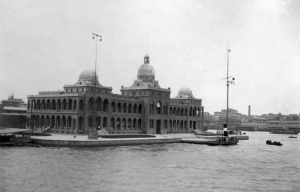Tags
abuse of power, Beijing, book review, China, city of gates, civil service, corruption, detective as mystery, detective at risk, eighteenth century, Elsa Hart, historical background, historical fiction, murder, mystery, race against time
Review: City of Ink, by Elsa Hart
Minotaur, 2018. 338 pp. $26
The year 1711 sees Li Du in Beijing, the place from which he was exiled, and to which he has returned, hiding the past two years in a modest clerkship at the North Borough Office. But when a double murder occurs at a roof tile factory—of a man and a married woman—he must play a public role, assisting his boss, Chief Inspector Sun, in the investigation.

The Kangxi Emperor, who ruled for 61 years, ushered in the era known as High Qing, the zenith of that dynasty. Anonymous court painter, probably early eighteenth century (courtesy Palace Museum, Beijing, via Wikimedia Commons; public domain)
At first, Li Du’s chores are minimal, taking down statements at Sun’s direction. But soon the scribe fastens on details that others have missed or dismissed as unimportant, which lead him to question the presumed verdict of a crime of passion.
The magistrate breathing down Sun’s neck, however, wants no part of this. In his view, all that remains is for the suspect in custody, the dead woman’s husband, to confess—and once he does, he’ll probably be set free, for the law protects his right to avenge his honor.
However, the husband insists he had nothing to do with the killings. And as Li Du amasses evidence the crime of passion fails to explain, that poses a problem for Sun. The chief inspector believes in justice and deplores corruption, but he also likes his job and loves his family, who’d suffer with him if he were disgraced. Disputing a magistrate is a poor career choice.
Nevertheless, he accepts Li Du’s theory that multiple motives and perpetrators may be involved. He gives his assistant four days to gather more evidence, under the guise of writing the detailed, accurate report the bureaucracy insists on. But if Li Du slips up or steps on the wrong toes, Sun can’t and won’t protect him.
City of Ink is a terrific mystery, and I like it even better than Jade Dragon Mountain, which introduced Li Du. City of Ink feels more sure-handed and avoids the few instances of melodrama and improbable derring-do on which Jade Dragon Mountain relied, but that’s not all. The later novel presents a mystery independent of the murder investigation yet also connected: Li Du himself.
Why has the onetime rising star in the civil service, reprieved from exile, not taken up his former life and aspirations? The humble clerkship at the North Borough Office doesn’t use his talents. He hasn’t remarried since his wife divorced him after his disgrace, and he lives an extremely modest existence at the Water Moon Temple, renting a room from the monks. Yet he’s on a private mission, a search for documents having nothing to do with his current duties. Why?
Connecting these dots requires careful plotting and, to be credible, a natural, unforced storytelling style. Hart excels at both. As Li Du’s sleuthing unravels the murders—with starts and stops and setbacks—he upsets established figures among the elite, likely to take revenge. Meanwhile, his search for documents about the past gradually bears fruit, and the two narratives connect.
As in the earlier novel, Hart provides a detailed, fascinating historical background, re-creating eighteenth-century Beijing street life through Li Du’s eyes:
A bright red spot amid the brown and gray clutter of leaves and mud caught his attention and made him stop. He stared at the tiny pool at the edge of the street, his thoughts suddenly saturated with the seeping color. His gaze shifted upward to where the decapitated body of a rat dangled at knee height from a length of twine strung beside the door of a dumpling stall. The proprietor, following Li Du’s look, indicated a roughly painted sign above the little body. A warning to all rodents who conspire to enter my shop. He pointed invitingly at the dumplings sizzling in a pan. Li Du swallowed, shook his head, and hurried away.
The narrative depicts a city besieged by scholars waiting to sit for the all-important civil service exam—six thousand hopefuls for 250 places. Hart portrays their carousing, cramming, buying lucky charms from charlatans, and good, old-fashioned corruption to reveal the capital and its ways and to advance her story.
Beijing is also a city full of gates and soldiers to man them, and when the drum beats, announcing the hour of closure, everyone must spend the night in the district where they are. That circumstance creates tension, as Li Du races against time and space—and the gates figure in the solution to the mystery.
City of Ink, like its predecessor, does employ one trope, the investigator at risk, and you can see that coming for miles. But that’s the only predictable element.
I highly recommend City of Ink.
Disclaimer: I obtained my reading copy of this book from the public library.








